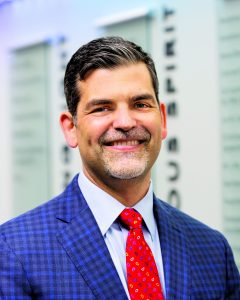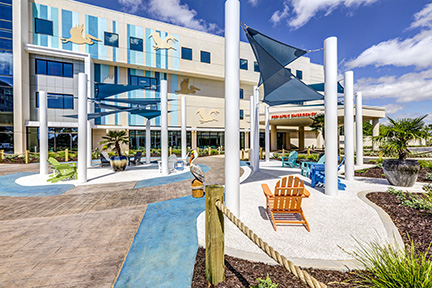Studer Family Children’s Hospital at Ascension Sacred Heart is well-equipped on the front line of the COVID-19 crisis as part of a national organization focused on patient care and safety. In addition to rolling out the first testing site in the area, Ascension Sacred Heart ultimately provided the model for doing so throughout Florida.
Dr. Jason Foland, MD, Pediatrician in Chief at Studer Family Children’s Hospital, sees critical trends in local endeavors to eradicate the epidemic. He draws attention to the great work of the healthcare system as it supports the community.
Since children appear to be naturally at a lower risk, the COVID-19 attention is often focused on preventing spread among the adults who interact with them. With precautions in place throughout the system, the hospital proves effective at keeping viral spread at bay and ensuring the safety of patients.
“Ascension Sacred Heart is fully prepared to provide all of the important health care and procedures that patients might need,” asserted Foland. “We’ve continuously monitored guidance from the Centers for Disease Control and Prevention and added strict safety precautions to help protect both patients and caregivers. We have implemented a universal mask use policy, and we screen doctors, nurses, and care teams before they enter a facility. We’ve also been staggering patient appointments, cleaning and sanitizing all areas more often, using separate emergency triage and care areas for patients with symptoms of COVID-19, incorporating remote patient registration to reduce face-to-face activities, limiting seating and placing decals on the floor to promote social distancing in waiting rooms.”
Also, as the region’s only pediatric emergency department, the Studer Family Children’s Hospital offers a team of doctors, nurses, respiratory therapists, pharmacists, and child life specialists – all specially trained in care for children, all available 24/7.
The primary risk of COVID-19 for children is infection, but also the secondary consequences– the isolation impacts on kids. “They’re social beings and they learn by interacting with other people. Substituting that with a form of social media compounds the effects of that social media in general. Children more so than adults need interaction beyond TikTock, Facebook, Instagram, or other social platforms. Parents need to be thoughtful about how they do that under the circumstances of viral spread,” says Foland.

When parents have concerns that their child has been exposed but is asymptomatic, the focus is on minimizing the child’s exposure to others, especially high-risk people. Refer to the CDC website for how long you should minimize contact with others. In the event that a child is symptomatic, a parent should contact a healthcare provider who will help triage whether the child needs to be seen immediately or not. Anytime that you think your child’s life is at risk, call 9-1-1.
Screening
While it is easy to grow numb to the screening questions asked of both patients and healthcare workers, the questions themselves are the first and most effective line of defense against the spread of the virus in the healthcare segment. Honest self-reporting allows medical staff to offer alternative arrangements for patient care, such as telemedicine. Foland says people shouldn’t be afraid to be honest, “People seem to be appreciative. [If someone has been exposed or presents ill with COVID-19 upon screening] we don’t ignore them. We find them the care they need to deal with their risk factors and help them address their illness.”
Foland maintains that medical practices need to stay open, elective surgeries need to continue, routine exams need to take place, and patients need to keep up on their immunizations.
The body needs to be in fighting shape on the chance it encounters the virus.
Don’t avoid your check-ups
Recognizing there are individuals in the community who might be avoiding check-ups and immunizations to prevent virus contact, particularly parents of young children, Foland asserts, “We don’t want people scared of seeking healthcare. There are dire consequences, such as chronic medical conditions that need treatment. Seeking medical care at appropriate times is more important than ever.”
In-patient Policies
Hospital policies fluctuate as recommendations and procedures shift with CDC recommendations. Current policy in the children’s hospital is one parent with an inpatient child at a time, with two parents (or otherwise identified primary caregivers) switching back and forth for care. “It’s hard of course. We’ve noticed that the children mostly miss their siblings, so we’ve been creative about that interaction, using Facetime for connectivity,” he explained, “but it’s hard.”
Even the youngest patients are affected by pandemic response policies. Expectant mothers have had many questions throughout the pandemic. With a thoughtful review of literature and science, the hospital has worked to develop processes that maintain the special bonding time between mother and baby, while keeping both patients, their caregivers and support persons safe.
Upcoming Flu Season
Dr. Foland addressed navigating the upcoming flu season alongside the patterns of COVID-19. “The same things that prevent the flu are the same things that prevent COVID-19– hand washing and face masks.” The flu vaccine, expected to be available around October 1, will be especially important this year. “With symptoms being similar for the two viruses, it might be reasonable to be tested for both [when symptoms occur],” Foland added.
Community Response
Foland applauds Pensacola’s response to healthcare workers. While Ascension Sacred Heart’s stockpile got them through the crisis point, the community offered resources from masks and shields to meals. “The ingenuity of the community to make protective equipment–everyone stepped up to get us through the initial part when there was a potential supply problem.”
Foland laments that masks themselves have become political. “Everyone should be doing everything they can to reduce the chance of transmission. Simply put, masks slow the pace of the virus moving through the area. We have the resources to take care of everyone, but if the spike exceeds the resources, then the system could be overwhelmed.”
Shout Out to Healthcare Heroes
Dr. Foland’s parting words encouraged fellow healthcare workers. “I want to give a ‘shout out’ to adult providers, not just at Ascension Sacred Heart, but all the area hospitals. They are out there taking the physical and psychological brunt of this, and their resilience is beyond impressive.”
As the balance between the healthcare force and citizens gives and takes, that model of resilience is important for all of us to follow.















